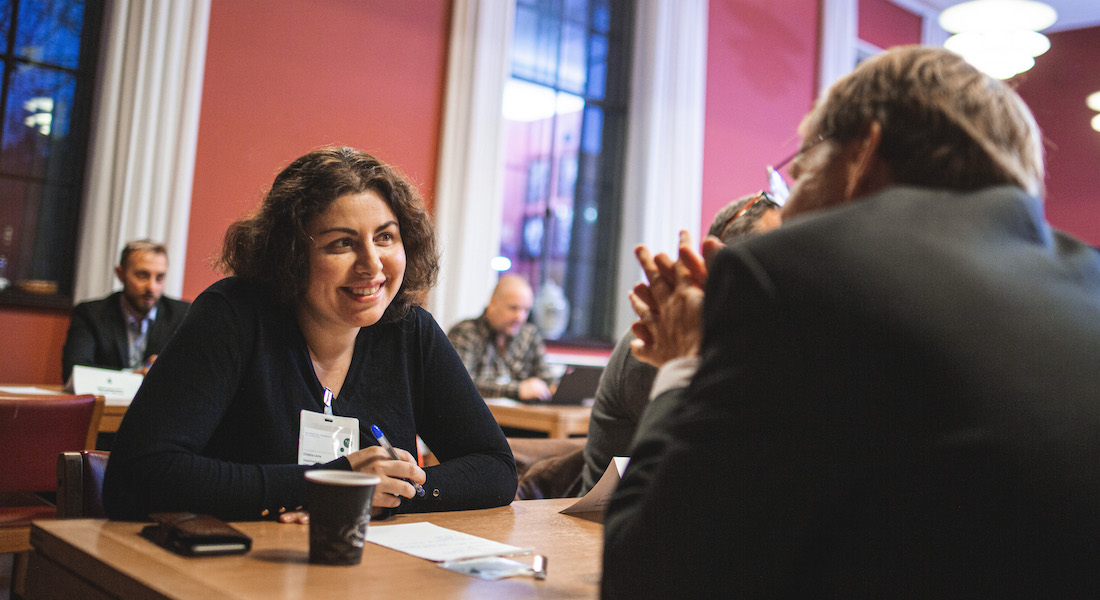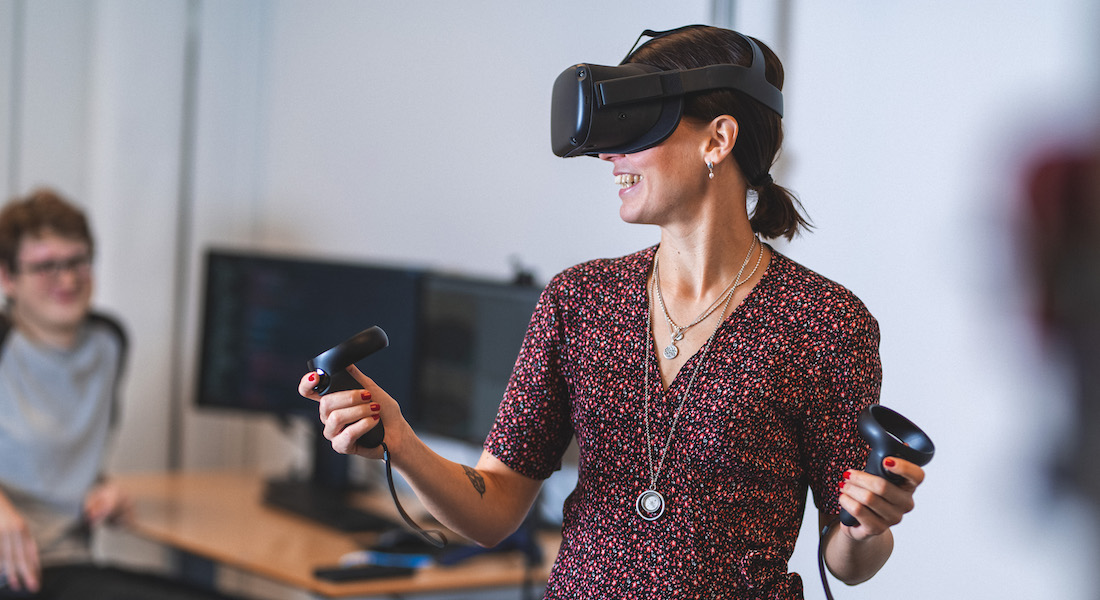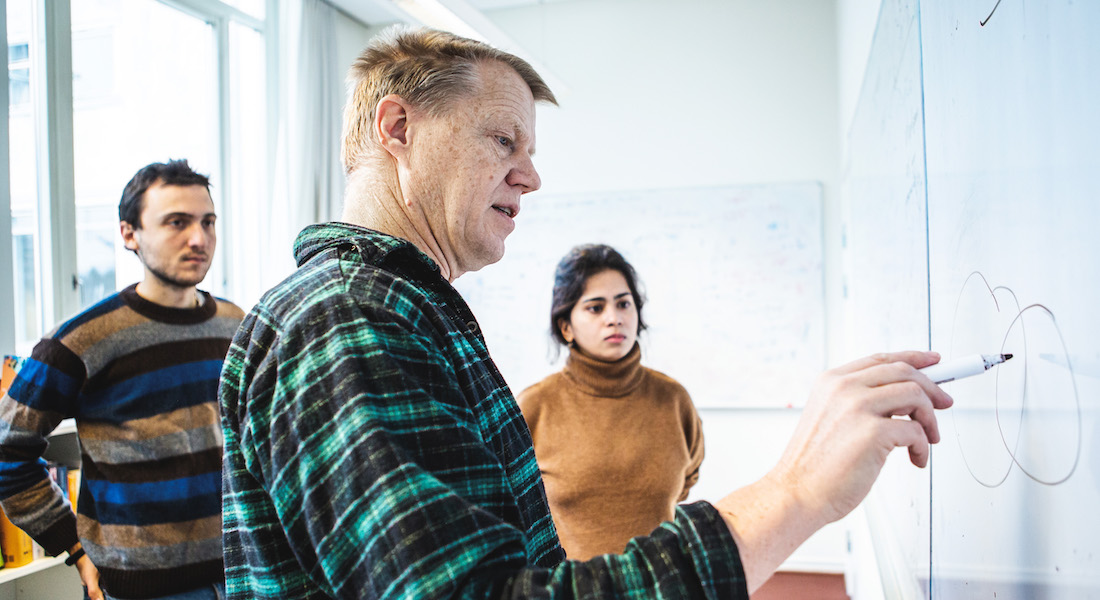A modern department under development

More research communication and business collaboration
A new Danish University Act was passed in 2007. The Act made it compulsory for all Danish universities to collaborate with the surrounding society, and the researchers were now obliged to communicate their research results and participate in the public debate.
The Department of Computer Science has traditionally had good collaboration with the outside world – especially with companies set up by the Department’s alumni – and has contributed to performing computer science tasks in society. However, after the new Danish University Act entered into force, the companies were now invited to join the Department’s panel of employer representatives, where they could discuss new initiatives with the Department’s management, for example the need for new student competences and ideas for the development of new subject areas.
Strengthened collaboration with the corporate sector was precisely one of the hobbyhorses of Martin Zachariasen, the then Head of Department. He was Head of Department from 2008-2015 and, in 2009, he founded DIKU Business Club as a more formalised forum for collaboration with the corporate sector. This forum was not only to provide the framework for the Department’s annual IT Career Day (for many years known as D-day), but was also to strengthen the companies’ opportunities for participating in research partnerships and knowledge sharing.
Since its establishment, DIKU Business Club has grown steadily in both membership and tasks, and the Department’ has continued its involvement in collaborations with external partners. DIKU is today a member of a number of business clusters and political initiatives aimed at bringing researchers’ expert knowledge into play in society.

What about the users?
In the first many years of DIKU’s history, the principal focus was on the theoretical and technical branches of computer science – in the same way as for other departments of computer science. But there have also been researchers who have been interested in the fact that we also need to focus on making the technology functional and useable for the people who are actually going to use it.
Peter Naur’s work on the human role in computer use has a completely central position here, and his work has helped form the basis for DIKU today having a strong research environment with internationally recognised researchers in the research field of Human-Centered Computing (HCC).
In the 00s and 10s, this field really took off, both at DIKU and internationally. Internationally, the world of research had started using Human-Centered Computing as an umbrella term for research into the interplay between people and technology – from design of user interfaces to collaborative technologies in complex organisations. The study programme Communication and IT was created in 2009 in a collaboration between the Department of Computer Science and the Faculty of Humanities. This helped finance new positions for HCC researchers.
In 2018, DIKU’s HCC section had grown so large that it made sense organisationally to divide it into two. Therefore, a number of the researchers were moved to the newly established section Software, Data, People & Society. The researchers in the two sections have repeatedly had a record number of scientific articles accepted at the most prestigious conferences (such as the CHI conference) in this field, and several of these articles have won awards for best article of the year.

DKK 40 million for algorithm research
Before 2013, basic research into algorithms had not been an actual core area of the Department of Computer Science, but it became so now. This occurred when Professor Mikkel Thorup returned to DIKU after having worked for 15 years at the prestigious research laboratory AT&T Bell Labs at Princeton University. Mikkel Thorup had previously been employed at DIKU from 1993-1998.
In the meantime, Mikkel Thorup’s research, particularly into algorithms and hashing, had made him world-famous. He could therefore instead have chosen a senior executive position in Google’s or Apple’s research departments. But as he said in an interview with the Danish daily Berlingske, he felt that “mathematics is more important than money.”
In 2015, Mikkel Thorup received Denmark’s biggest individual researcher award, Villum Kann Rasmussen’s Annual Grant for Technical and Natural Science Research of DKK 5 million. “With your original research activities, you have conceived solutions to problems that were regarded as insoluble,” was one of the reasons given for the award.
The BARC research centre headed by Mikkel Thorup was set up in 2017. The centre received a preliminary grant from VILLUM FONDEN of just under DKK 40 million. BARC stands for Basic Algorithms Research Copenhagen and is home to leading experts in this field who have repeatedly created mathematical breakthroughs.
According to CSRankings for 2021, the University of Copenhagen is in fourth place of the best universities in the world, measured by the number of top articles in algorithmics. DIKU’s algorithm section thus overtakes recognised universities such as Stanford University, Columbia University and University of Washington.

DIKU today: An extrovert and growing department
DIKU has grown considerably in recent years. In just a few years, the Department has gone from having approx. 113 employees and 800 students in 2014 to having more than 200 employees and approx. 1,200 students in 2021. The income generated by the Department has also increased markedly from just under DKK 76 million in 2014 to an expected income of DKK 156 million in 2021.
This growth has been driven by the surrounding society’s need for more IT specialists, and, in particular, increasing demand for competencies in all areas of computer science, including artificial intelligence and Data Science.
But the growth is also driven by the Department’s desire to take responsibility. Denmark must remain one of the most digitalised countries in the world, and we must invent even better and more innovative ways of using technology to the benefit of us all.
To meet this objective, DIKU today participates in more interdisciplinary, long-term and close partnerships with other research environments, companies and public institutions than ever before. We believe that the best results are created via collaboration – also with new areas with which we have not collaborated before. By helping to elevate other disciplines than our own, we also improve our own competencies and our study programmes.
One good example is the SCIENCE AI Centre, which was established at the Faculty of Science in 2018 to incorporate techniques from artificial intelligence into more disciplines and study programmes. The centre is headed by DIKU’s Professor Christian Igel.
The following year, in 2019, DIKU opened its doors to two new and up-to-date Bachelor’s programmes: Computer Science and Economy and Machine Learning and Data Science The two combined programmes have attracted more young people to the field of computer science, resulting in DIKU admitting 84% more new bachelor students in 2020 than two years earlier.
In addition, DIKU works to put computer science on the timetable in both primary and lower secondary schools and upper secondary schools, which we offer teaching material, workshops, and courses developed by experts as well as visits and presentations by our students.
Our most important footprint
Today, DIKU is one of Europe’s best departments of computer science with world-renowned researchers in all corners of computer science. Like other leading departments of computer science, we have always attached great importance to the development of new fundamental methods and computer science as its own discipline. At the same time, we contribute to addressing the challenges we face as humans and society, with excellent applications – always rooted in a deep fundamental understanding.
Long-term competencies will always be a keyword for our study programmes. We educate our students to understand the fundamental principles behind the technology, rather than which systems are hot right now. This is how we best equip our students to be able quickly – and throughout their careers – to adapt to new technologies, new programming languages, and all the other constant changes occurring in a digital world.
This is precisely why DIKU’s most important contribution will always be the thousands of graduates and young researchers that we have hatched over the years, and who have brought their knowledge with them out into a wealth of different societal functions throughout Denmark – and the world. At Vestas. At Mærsk. At Novo. In the Danish Ministry of Finance. At Apple. At Amazon. As consultants and entrepreneurs. In start-ups. In gaming companies. In all Danish banks.
We have created the future for 50 years. And we will continue to do so.
DIKU in numbers
1970
- When the Department was founded in 1970, it had 40 employees
- The academic staff members consisted of a professor, three fixed-term lecturers, two full-time associate professors, four part-time associate professors and 24 instructors
- The administration consisted of two secretaries and four technical assistants
- The Department taught 500 students at bachelor level and 50 at master level
2021
- In 2021, DIKU has just under 200 employees, of whom approximately 160 in academic positions (including assistant lecturers, external examiners and external lecturers) and 34 administrative positions
- Just under 1200 students are enrolled in DIKU’s three study programmes – Computer Science (Bachelor’s programme and Master’s programme), Computer Science and economy (Bachelor’s programme) as well as Machine learning and data science (Bachelor’s programme)
- In practice, the Department teaches even more students, as DIKU also contributes to the study programmes Health informatics and Communication and it.
